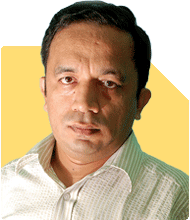Vishal Bisht | Answer |Ask -Follow
Start-up Mentor; E-commerce, EdTech Expert - Answered on Mar 10, 2024
An aeronautical engineer -- he is a member of the Aeronautical Society of India -- Vishal is a versatile technologist and entrepreneur with a passion for artificial intelligence, blockchain and e-learning solutions.
His company has been providing software development and customised solutions to several e-commerce businesses and EdTech platforms across India.
Vishal is interested in India's start-up innovation and has mentored aspiring entrepreneurs and start-ups for over 20 years.... more

I am an MBA, 23 working in a consultancy start-up. I want to start my own firm and need some guidance. My father has some ancestral property in our village near Secunderabad. Can you share some ideas? What kind of investment will I need?
You may like to see similar questions and answers below
Ramalingam Kalirajan |10893 Answers |Ask -Follow
Mutual Funds, Financial Planning Expert - Answered on Jul 02, 2024
Milind Vadjikar | Answer |Ask -Follow
Insurance, Stocks, MF, PF Expert - Answered on Oct 04, 2024
Dr Ganesh Natarajan | Answer |Ask -Follow
Career Expert - Answered on May 28, 2025
Reetika Sharma |425 Answers |Ask -Follow
Financial Planner, MF and Insurance Expert - Answered on Sep 24, 2025
Ramalingam Kalirajan |10893 Answers |Ask -Follow
Mutual Funds, Financial Planning Expert - Answered on Dec 15, 2025
Ramalingam Kalirajan |10893 Answers |Ask -Follow
Mutual Funds, Financial Planning Expert - Answered on Dec 15, 2025
Radheshyam Zanwar |6746 Answers |Ask -Follow
MHT-CET, IIT-JEE, NEET-UG Expert - Answered on Dec 15, 2025
Ramalingam Kalirajan |10893 Answers |Ask -Follow
Mutual Funds, Financial Planning Expert - Answered on Dec 15, 2025
Ramalingam Kalirajan |10893 Answers |Ask -Follow
Mutual Funds, Financial Planning Expert - Answered on Dec 15, 2025
Ramalingam Kalirajan |10893 Answers |Ask -Follow
Mutual Funds, Financial Planning Expert - Answered on Dec 15, 2025
Samraat Jadhav |2508 Answers |Ask -Follow
Stock Market Expert - Answered on Dec 15, 2025
Ramalingam Kalirajan |10893 Answers |Ask -Follow
Mutual Funds, Financial Planning Expert - Answered on Dec 15, 2025
Reetika Sharma |425 Answers |Ask -Follow
Financial Planner, MF and Insurance Expert - Answered on Dec 15, 2025
Radheshyam Zanwar |6746 Answers |Ask -Follow
MHT-CET, IIT-JEE, NEET-UG Expert - Answered on Dec 15, 2025




























